Exhibition at Museum für Gestaltung Zürich
On view: February 11 – June 6, 2022
Self-learning algorithms, rare earths, and robots bestowing blessings: In the exhibition Planet Digital, mounted by the University of Zurich and the Museum für Gestaltung Zürich, innovative research teams meet up with creative minds from the fields of design and art. In around 25 installations, they invite visitors to experience the science of digitalization with all their senses.
“Digitization” originally referred only to the conversion of analogue information into digital data. But today the broader phenomenon known as “digitalization” is fundamentally changing our world. To explore the implications of this transformation, the exhibition Planet Digital at the Museum für Gestaltung Zürich relies on the creative collaboration between research and design. Starting February 11, computational linguistics will meet up here with interaction design, psychology will contend with virtual reality art, and political science will engage with visual communication. Hosted by the University of Zurich in cooperation with the Museum für Gestaltung Zürich, the exhibition was developed jointly with Zurich University of the Arts (ZHdK) and Zurich University of Applied Sciences (ZHAW) and made possible by the Digitalization Initiative of the Zurich Higher Education Institutions (DIZH) and the Mercator Foundation Switzerland.
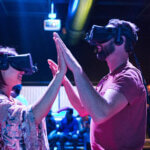

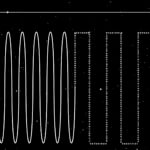
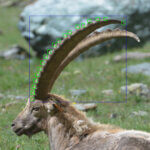
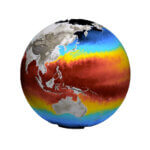
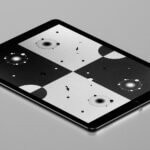

Surveying the digital planet
If you want to find out what’s behind the digital transformation you have to dig deep, because gold and rare earths are indispensable for today’s electronic gadgets. In an effort to reveal the complex global connections concealed behind the shiny surfaces of the mobile technology industry, a team affiliated with the Department of Geography at the University of Zurich and the Immersive Arts Space at ZHdK provides insights into the precarious working and living conditions of gold miners in the Democratic Republic of Congo in the installation Kamituga | Digital Gold.
Another illuminating peek Behind the Scenes involves an innovative audio walk created by a historian working with a design studio that lets viewers discover and explore what lies behind the internet infrastructure. Complex algorithms and encryption technologies are required to make internet communications secure. Two mathematicians demonstrate exactly how this works with a photogenic wall of lava lamps and a visual installation created by Hubertus Design.
Intelligent software
Just how central algorithms are to digital technologies is demonstrated using the example of automated decision support systems, which are increasingly used to decide who is invited to a job interview, who receives a loan, or how high an insurance premium will be. But do these systems always decide fairly? This question is explored in four short films for which researchers at ZHAW teamed up with the non-profit organization AlgorithmWatch Switzerland and the design studio Tristesse.
Closely related to this issue is our fear of surveillance, which is addressed in a fictional story called M.D. likes to have a beer in the evening. A psychologist, a designer, and a historian wrote the story based on a collection of actual surveillance logs.
Artificial intelligence is also increasingly being used today in animal ecology, with machine learning applications helping researchers to identify or count individual animals for example. The installation Triggered by Motion reveals the enormous amount of data that has to be evaluated for this purpose. The walk-through video pavilion, made from recycled PET bottles, assembles wildlife camera footage from 21 locations around the world. In addition to the University of Zurich, numerous other research and environmental protection organizations are involved.
Artificial art
While nature is becoming more and more part of the digital space, machines are conversely growing more nature-like. The Indian-Danish artist duo Pors & Rao developed PATHOS, a toolbox that makes robots appear to be animate objects. In the installation ANIMA II, floating and pulsating “underwater creatures” made from inanimate material react dynamically to viewers. The project was inspired by an exchange of ideas between the two artists and a biologist from the University of Zurich.
In general, digitalization offers many new opportunities for art. The works Big Sister and Vertigo, for instance, use eye movement tracking technologies otherwise deployed in medicine to create interactive works, and a historian makes flow charts using a drawing machine devised by Jürg Lehni.
From the courtroom to the prayer room
Those who like to get actively involved can try their hand at solving a murder case in Planet Digital. Film students from ZHdK shot a crime thriller that incorporates the latest in computer forensics. Many other phenomena brought about by the digital transformation are awaiting discovery in the exhibition, from deep fakes to computer games and virtual reality installations, and from research satellites to electronic waste. And if all this makes you feel a little uneasy, you can have a robot give you its blessing.
Team
Dr. Katharina Weikl, UZH Graduate Campus
Christian Brändle, ZHdK, Direktor Museum für Gestaltung
Prof. Dr. Christoph Heitz, ZHAW School of Engineering, Forschungsschwerpunkt Business Engineering and Operations Management
Prof. Dr. Volker Dellwo, UZH Institut für Computerlinguistik
Dr. Björn Franke, ZHdK Visual Communication
Practice partner
Running time: 2021-2022